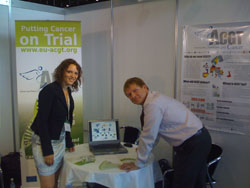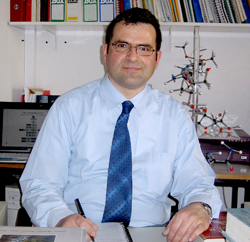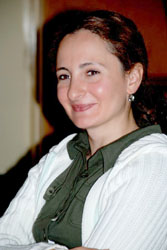 |
In this Issue
Some Other Links
| Editorial Dear ACGT community,We are glad to provide all ACGT members and interested collaborators with this third issue of the ACGT newsletter. This autumn 2008 edition will be the occasion to present our work to date and expose the challenges and the great opportunities that are showing up. Almost entering
into its fourth year, the ACGT
project is now showing the full scope of its ambitions with the
integration of high level computable solutions for full clinical trials
management. Great progresses have been made and exiting new
opportunities for developments, with new organizations such as EORTC
and other practitioners getting on board, that will considerably expend
the scale for collaboration across Europe. Clinical Trials  Latest developments in the world of clinical trials in cancerACGT aims to provide a Europe-wide infrastructure to support multi-centric, post-genomic clinical trials on cancer, and thus, enable the smooth and prompt transfer of laboratory findings to the clinical management and treatment of patients. ACGT is then a mean to facilitate bench-to-bed communication in Cancer Management. To achieve this communication aim, semantic integration of diverse biomedical databases is needed. Within the ACGT framework, Integration of data is achieved by means of a mediator system that is based on an ontology [1]. Ontologies are a major trend in IT
systems. They provide a formalized scheme of reference for different
data resources and different users. A basic objective of ontologies is
to enable better semantic integration of data, not only between humans,
but also facilitating human-machine communication. Thus, ontologies are
one strategy within the huge field of Artificial Intelligence. It is
important to note that with respect to different terms and languages
used, ontologies are completely neutral. Since ontologies aim at
providing a formal definition of a class within a specific domain, it
is possible to build an ontology in a completely language-neutral way.
There is no need to attach any natural language term to the classes.
Nevertheless, it can be done, since naming the classes with natural
terms facilitates the development of the ontology and fosters its
transparency for users. Products and Services OncosimulatorThe ONCOSIMULATOR is at the same time a concept of multilevel
integrative cancer and (treatment affected) normal tissue biology, an
algorithmic construct and a software system which aims at supporting
the clinician in the process of optimizing cancer treatment by
performing individualized in silico experiments. Data access
services
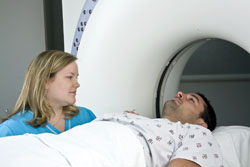 One
of the
challenges in carrying out bio-molecular research
is that relevant data is distributed across many heterogeneous data
sources. The trial-specific data includes imaging data, DNA microarray,
and clinical data reported on Case Report Forms. Next to that,
bio-informaticians need to access data stored in public bio-molecular
databases such as Swiss-Prot, KEGG, and GEO. These databases use
different access protocols, data formats, query mechanisms, schemas,
identifiers, ontologies, etc. The ACGT platform uses data access
services to hide the syntactic differences of the databases from other
web services and end-users. Genomic-enabled
EHR
It is already well known that cancer is a genetic disease, and
therefore genomic information should be required to diagnose, stratify
and treat cancer. The main current domains and applications of genomic
data in research and clinical practice can be divided in the following
categories: Grid news Custodix Anonymisation Tool (CAT) The
best proof
that ACGT achieves its goal of advancing
medical science through offering an IT platform that facilitates
seamless and secure access and analysis of multi-level clinico-genomic
data, is a demonstration of its capabilities in the field, using “real”
data. Thus the success of the ACGT project partially depends on the
volume of high quality data that can be analyzed in the different
cancer related pilot trials. Feature article Usability in ACGTThe use of computers, software applications
and IT in daily medical
life and in research is rapidly increasing. The main task to ensure the
usability of the systems developed is to accomplish what the users
need. Generally, software is developed without much evaluation during
the development process. To avoid this well known risk, it is of utmost
importance to involve the end-user from the design phase of new
software, during the development process and to secure an iterative
evaluation of the software by end-users. Commmunity view Euro-Japan ICT cooperationThe relation between European and Japanese organizations is
really important For the ACGT project in the ICT field. This is the
reason why ACGT is identified in the Euro-Japan ICT cooperation. This
web portal is devoted to S&T cooperation between Europe
& Japan in the field of Information and Communication
Technology. This Web site is: www.eurojapan-ict.org Events ICT 2008 in Lyon: Europe’s biggest research event for information and communication technologies ICT
Lyon will be
the
occasion to gather the widest community
working on ICT, aiming at designing the European schedule of research
for the next decade. Knowing that the general investment planned around
ICT is around 2 billion Euros for the next 2 years, the needs for
collaboration and common objectives is strong and this event will be
the occasion for the EC to meet with all ICT actors to establish the
strategy for the future use and design of web technologies. The largest
academic and corporate organizations will be present ensuring that the
event will have a major impact. 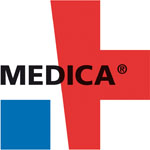 Medica 2008Fraunhofer-Institut
Biomedizinische Technik will introduce the
ObTiMa technology in Düsseldorf (germany) on Wednesday 19th - Saturday
22nd November 2008 during the 40th International Trade Fair with
Congress World Forum for Medicine. A poster has been made to help in
disseminating the Obtima interface during this event. Legal and Ethical The latest thinking on legal, ethical and data security issues surrounding clinical trialsACGT’s aim is to develop a European Knowledge Grid
infrastructure offering methods and systems for ameliorated medical
knowledge discovery. This can only be done through a complex
integration of biomedical data and information which includes not only
the modelling, visualization, data mining and grid technology of
clinical information relating to tissues, organs or personal
health-related information, but also information at molecular and
cellular levels. By collecting, storing, sharing, analyzing
and collating all these cellular and intracellular data particularly
from cohorts of cancer patients we enter into a bundle of Intellectual
Property Rights (IPRs). Whereas data protection has been in the focus
of ACGT from the very beginning, IPR-issues will become a second focal
point of legal research in the second half of the project. Life in ACGT Technical
workshops in Lausane
|
